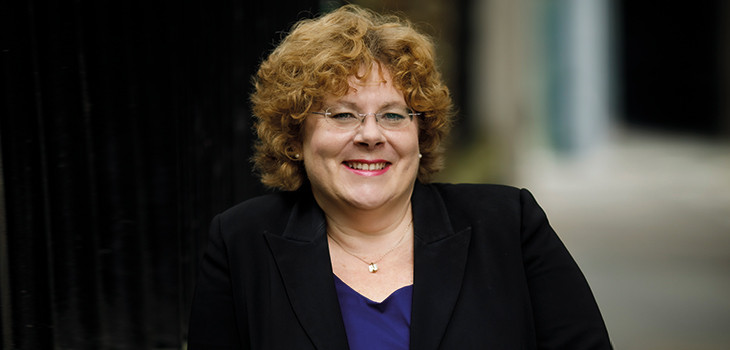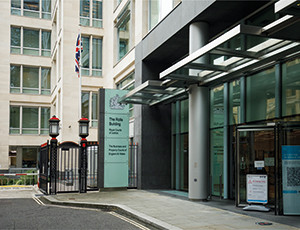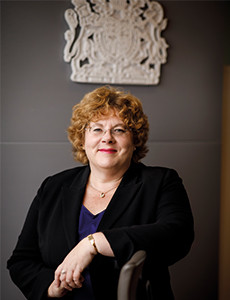
Karen Shuman has been breaking new ground by becoming the first woman to be appointed Chief Chancery Master.
Her new role comes just three years after she successfully applied to become a chancery master, going straight from practice at the Bar to full time salaried judge. ‘It was a huge leap of faith to make such a significant career change without any previous experience on the bench,’ she says. ‘But it paid off—as a colleague joked, my honeymoon period just kept going.’
Chief Master Shuman now finds herself leading five masters and 21 deputy masters whose roles have evolved radically over the last six years, driven by her predecessor Matthew Marsh (Chief Chancery Master 2014-2021) and by Lord Justice Briggs’s 2013 Chancery Modernisation Review, taken forward by then Chancellor Geoffrey Vos, now Master of the Rolls.
With masters now having trial jurisdiction, she says the old image that becoming a master was a ‘judicial cul de sac on route to retirement’ has been turned on its head (see box outs).
And there are more potential changes under review—including a ‘high level’ discussion on the title ‘master’, particularly pertinent now, given that, alongside Chief Master Shuman, two of the three masters are women—Julia Clark and Francesca Kaye— alongside Master Iain Pester, with two vacancies to be filled.
‘There are valid arguments on all sides,’ she notes. ‘I think it would be helpful if the name was one that lay people could understand meant we are simply judges—I think “master” confuses matters. But I am still considering how this would best be resolved.’
She is conscious of the significance of her appointment. ‘Our aspiration should be to get to a time where the fact that somebody is a woman, from an ethnic minority background or has any other protected characteristic, isn’t used to define that person in their role,’ she says.
‘But we’re not there yet, so I am fully aware of how important it is for people to see change happening within the judiciary.’
The road to the bench
So how did her career develop to bring her to the Rolls Building? The walls of her room are covered in photographs of wild animals. ‘I think if I hadn’t read law, I would have read zoology and I’d probably be somewhere in the Rift Valley,’ she says.
Instead, she became the first in her family to go into law.
‘I’m not sure where the idea came from,’ she says. ‘But I do know that, in my early teens, I announced to my parents, to their surprise, that I was going to become a barrister. I always enjoyed looking at things from different perspectives and I really enjoyed public speaking. No one suggested it as a career. But I am very tenacious, so I set my mind to it.’
She read law at Birmingham University. After Bar school, she did her pupillage at a mixed, predominantly civil set. For her last 15 years at the Bar she was a member of 1 Chancery Lane, specialising in chancery work and professional negligence.
‘Right from university, I loved trusts and property,’ she recalls. ‘It just made sense. It was beautifully analytical and fascinating.’
She and her husband have two sons. ‘We both felt strongly that the children should have a parent at home,’ she says. ‘I was always very driven by my career, so it made sense for Paul to stop work. This still remains despairingly unusual. I thought society had moved on, but he is still one of the few dads at the school gates.’
She loved being at the Bar but, by 2017, she thought: ‘What am I doing? I can’t work the hours I’m working and still play a meaningful role in our sons’ lives.’
When she spotted a rare vacancy for chancery master, she wrestled with the idea of leaving the Bar. But friends and colleagues encouraged her and it felt the right move. She loved being in court and cross-examining but, with so few cases actually going to court, she was increasingly stuck in a room surrounded by boxes.
‘I thought this would be an amazing opportunity to get trial experience from the bench and to do it in the High Court,’ she recalls.
She had no idea if she would ‘sink or swim’. But she instantly loved her new life. She was only three years into the role when the chief’s job came up and, again, she was encouraged to apply.
‘I said I couldn’t—I had only been judging for such a short time,’ she says. ‘But colleagues and friends pushed me to consider it—and I thought, yes, I can do it. You have to be realistic, but you also have to push yourself and not just take the safe approach.
‘It is the same with life—you don’t want to look back and regret not doing things.’
Diversity matters
It has been a sharp learning curve. There are currently two vacancies for masters, with a competition due to be run early next year. Shuman is hoping a business case can be made out for a seventh master, given the exponential increase in their workload.
The work is shared with a ‘remarkable’ pool of part-time deputies, she explains, which includes very seasoned retired masters, such as Matthew Marsh and Paul Teverson. This is ‘refreshed’ by a ‘new’ pool, including solicitor Jason Raeburn, the youngest to be appointed at just 32.
One challenge for Shuman is to widen the deputy pool’s diversity profile, which currently includes just two women and two from ethnic minority backgrounds. One approach is to encourage a wider range of applicants, and she has invited employed barristers and those working in bodies such as the Government Legal Service to shadow her.
‘Our profile needs to change’, she says. ‘But that’s true at all levels in the senior judiciary.’
But improving diversity can’t be solved by a single step, she says. It means going back to basics—including going into schools to empower youngsters to consider a career in law.
‘There are a lot of incredibly talented people but the opportunity to progress, in whatever walk of life they go into, isn’t necessarily there,’ she says. ‘But there should be nothing holding you back—it shouldn’t matter what your background is, how you identify yourself, what your religion is, or what sexual preferences you have.’
But, underpinning all discrimination, is socioeconomic disadvantage, she says. ‘You can’t look at gender or race in boxes—you have to look at it as part of a unified whole.
‘It would be fantastic to have more ethnic minority deputies or masters but that, alone, won’t solve everything unless you tackle the underlying problem that the same opportunities are not there for everyone. And that goes right back to the start of how you look at yourself in life and what you feel you can accomplish and achieve.’
Shuman is also concerned about intersectionality, pointing to a Bar Council report on pay rates which found that, in some areas of law, ‘if you’re a black woman, you earn less than you would if you were a white woman, who earns less than she would if she were a white man—how can that be right?’
The key is to encourage talented people into law and then to consider a judicial role. But if they don’t see a diverse bench, she says, they may not feel the judiciary is for them.
‘I didn’t feel any sense of “imposter syndrome” in applying, even though there had only been one woman master and it was traditionally seen as the preserve of mature men,’ she says. ‘But that is a rather antiquated view of what a chancery master is, so I didn’t feel remotely inhibited in applying.’
Efforts to improve diversity have driven up applications from underrepresented groups, but that hasn’t translated into higher numbers of appointments in senior courts.
Ministry of Justice data earlier this year found black, Asian and minority ethnic candidates represented 23% of applications across all legal exercises over the past three years, but only 12% of recommendations for appointment. While there has been a small rise in the number of Asian judges since 2014, from 7% in 2014 to 10% this year, the proportion of black judges has remained the same, at 1%.
While about a third of court judges and half of tribunal judges are women, the number in High Court and above roles is lower at 29%.
Shuman chairs the Equality, Diversity and Inclusion Committee at Lincoln’s Inn. The committee started out as a forum for women, then a steering group in 2017, before becoming a committee earlier this year.
‘In the scheme of how slowly things can move, this was positively a sprint!’ she says. ‘But I’ve had nothing but encouragement from the treasurers and the senior members of the Inn in their desire to see this committee make a difference.
‘We don’t live in an equal society and there isn’t equality of opportunity. The EDI Committee recognises that encouraging those from the widest possible range of identities and backgrounds to come to the Bar is a vital first step in widening the recruitment pool for the judiciary. That forms a core part of its statement of intent.’
A decade on from the Equalities Act 2010, is it now time to be bold?
There are different schools of thought on the approach to take, she acknowledges. ‘Some people say you should just make changes and be radical. But my view is you need to embed change and bring people with you. What you can’t do is start alienating people.’
She is concerned that ‘woke’ is being used almost as a term of abuse. ‘It’s “woke” and therefore it’s discounted rather than taking time to look at what’s trying to be achieved,’ she says. ‘But if you bring people with you, it doesn’t have to be at a snail’s pace. It just allows you to build a solid foundation to take bigger steps forward.’
So, could quotas be that big step forward?
‘I haven’t yet come to a firm view on quotas,’ she says. ‘But I am wondering if this could be the way to kickstart a move to the next level. What I will not accept is people saying “you only got that position because of who you know or because of a protected characteristic”. That is wrong. You got the role because you deserved it.’
Striking a balance
The last 18 months have been intense as the pandemic took hold. ‘None of us would ever have chosen to go through this and it has been tragic for so many families, but it has also revealed people’s strengths and resilience,’ she says.
‘Our staff in the Rolls Building have been fantastic. We moved seamlessly to remote working and we carried on throughout the lockdowns.’
She initially worked from home but found that hard to combine with her husband home schooling their two sons, so she returned to her office.
‘What we have learnt is that not everything has to be done in person, although I do prefer people to be in front of me because staring at a screen for umpteen hours a day is tiring,’ she says. ‘Certainly, with hearings lasting up to half a day, I can see the logic of those continuing to be held remotely unless there is a need to have it in person. It also stops us being so London-centric by opening up opportunities for people to dial into hearings from other parts of the country.’
She is also very aware of the importance of mental wellbeing and having a good work/life balance.
‘It’s very easy to get sucked into work and forget about yourself,’ she says. ‘I tell my colleagues that this is a marathon, not a sprint—you are never going to be able to get all the work done at the moment, given how high the work levels are.’
For too long, there was a ‘pack mentality at the Bar that, to prove yourself the best, you had to work the longest hours,’ she says. ‘But that is just a complete fallacy and I think that is changing.’
In the meantime, Shuman is enjoying breaking the mould. She has had people assume she is a man ‘because a man would be a master and a judge. But you get that in many careers which people associate with male roles,’ she says wryly. ‘Articles that write about me as “he” are a bit annoying and, occasionally, I’ll fire off an email and remind them that there are actually three female masters.’
A 21st century Chief Chancery Master

Shuman herself sums up the lessons she learnt from her predecessor Matthew Marsh—context, compassion, courage and communication. ‘You need to understand the world outside the Rolls Building, the commercial or domestic context of the case,’ she says. ‘You need compassion never to lose sight of how your decision will impact on real people. But you still have to decide the case, so you need legal courage and integrity to make tough decisions and follow the law, even if it is harsh. And finally, communication is not just about expressing yourself concisely but also about listening.’
‘I expect things to be done properly and on time, but I won’t put in unreasonable time limits unless it is unavoidable. I guess I try to be human.’
Another change she is making is using the gender neutral ‘they’ in legal texts and judgments where the issue is generic. ‘I know some people find the grammar offensive, but I think grammar, like many things, has to move with our times.

She describes it as a transition period. ‘Masters have always been an important part of the mechanics of the Chancery Division, but many then retired so it was not seen as having a career path.’ But she points to former Master Paul Matthews who is now a specialist chancery circuit judge in Bristol.
She is keen to move the role of masters on yet again. ‘The next thing I want to tackle is that, because we are such a small group, people have a tendency to forget about us. It would be helpful if we were included when an announcement goes out asking for expressions of interest about sitting in other jurisdictions, such as the Court of Protection. I firmly believe that you can bring strength to a role by gaining experience in other areas of law.’
Grania Langdon-Down is a freelance legal journalist.










